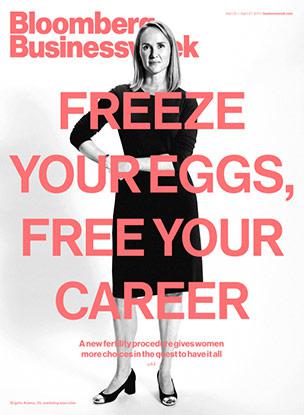Most articles about the increasing number of American women who have children in their late 30s or 40s manage to shame and blame them. They are told they are selfish, caring too much about their careers to press pause for a baby or too little about their child to have had him at a sprightlier age. They are told they’ll be lonely and out of step with their peers. They are told they are clueless, conveniently “forgetting” that their fertility declines with age. All of which is why it was heartening to read this week’s Bloomberg Businessweek cover story about successful women freezing their eggs. Writer Emma Rosenblum wrote it without being judgmental and provided actual statistics about why women are going the egg-freezing route instead of having children earlier: It’s not because they forgot to have kids or wanted to spend extra years drinking cocktails or were chasing the corner office—it’s because they don’t have partners.
A full 88 percent of women who freeze their eggs say they haven’t had kids yet because they don’t have a partner. But there are other factors causing women to delay childbirth. Rosenblum also cites an NYU study of 183 women who froze their eggs, which shows that 19 percent of those women would have had kids earlier had their workplaces been more flexible.
The reaction to the piece so far has largely been about the misleading coverline, which says “Freeze Your Eggs, Free Your Career.” “Solution to all of your problems, ladies,” Jezebel’s Erin Gloria Ryan tweeted this morning, “simply be rich enough to freeze your eggs.” But that’s really not what Rosenblum is arguing in the piece. All of the women in her story wish they could have had kids earlier—it just wasn’t in the cards. And Rosenblum is careful to point out that freezing one’s eggs is a very expensive proposition: It can cost up to $12,000, not including storage fees. She also mentions two companies that are trying to democratize egg freezing, charging a $1,500 down payment and then $250 a month for the next 24 months, which Rosenblum describes as putting “eggs on layaway.”
Certainly, that’s still a lot of money, and it’s out of reach for a lot of women who may be delaying childbirth for financial or relationship reasons. And yes, it would be great if health insurance covered this. It would also be great if employers and the United States made it easier for people of both sexes to raise kids, but that ain’t happening either.
It’s a harsh reality that professional women—you know, the audience for Businessweek—are at pivotal points in their careers at the same time when their fertility begins to decline. Rosenblum quotes an MBA grad named Emily who is single and working 100 hours a week, who felt a huge weight off her shoulders when she froze her eggs. “It’s like, thank God, I don’t have to focus on having kids quite yet. I’m not in a real panic anymore,” Emily says.
If we want more women to be able to have high-powered jobs and families, and if we want women to be able to raise children with partners, we should welcome this option. That egg-freezing technology has evolved and the practice has become less stigmatized is a very good thing.
